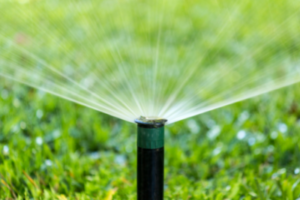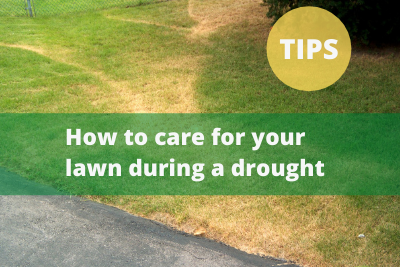Many of us are enduring extended periods of hot, dry weather. And some parts of the country are experiencing drought conditions. It’s taking a toll on lawns and gardens. But you don’t have to surrender your landscape to these less-than-ideal conditions. Sure, you may have to reset your expectations for the season, but there are some things you can do to effectively deal with the lack of rain and reduce turf stress.
Watering
 First, if you have an irrigation system, now is a good time to check water lines for leaks and sprinkler heads for cracks. You want to take advantage of every ounce of water available. You’ll also want to check with your local water provider to make sure you are staying within current water restriction guidelines.
First, if you have an irrigation system, now is a good time to check water lines for leaks and sprinkler heads for cracks. You want to take advantage of every ounce of water available. You’ll also want to check with your local water provider to make sure you are staying within current water restriction guidelines.
When you do water your lawn, the goal is to irrigate the soil as deeply as possible. The best way to do this is by watering early in the morning or after the sun goes down for 10 minutes on, 20 minutes off over a 90-minute period. Time of day is important because it’s the difference between water that penetrates the soil vs. evaporating on the surface.
As for frequency, the experts have this rule of thumb: apply no more than one-half inch of water every 2-4 weeks. The infrequent watering will do wonders for the roots of your grass, which is what you want.
Let cool-season grasses such as fescues and Kentucky bluegrass turn brown. Dormant grass goes into protection-mode by stocking up nutrients so that it can recover quickly when conditions are more favorable for growth.
Mowing
When cutting your grass, adjust your mower blade to a higher setting. This promotes root growth. Mow as frequently as you need to so that no more than one-third of the grass blade is cut. Taller grass acts as a shade for the soil and will retain whatever amount of water is in the ground.
Fertilizing
Postpone dropping fertilizer until the fall so that you encourage grass to go dormant. And when you do use fertilizer, make sure it provides your lawn with both nitrogen and potassium.
Your local independent lawn and landscape dealer can give you advice on any specific problems or concerns that you have. They can also recommend expert landscapers who can test the quality of your soil, provide the proper nutrients, and give you expert advice on how to keep your lawn looking great. To find a dealer near you, click here.

